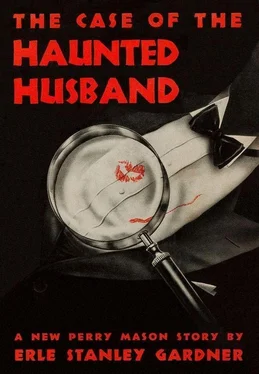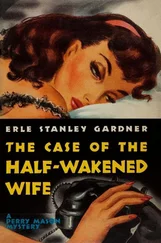Erle Gardner - The Case of the Haunted Husband
Здесь есть возможность читать онлайн «Erle Gardner - The Case of the Haunted Husband» весь текст электронной книги совершенно бесплатно (целиком полную версию без сокращений). В некоторых случаях можно слушать аудио, скачать через торрент в формате fb2 и присутствует краткое содержание. Город: New York, Год выпуска: 1941, Издательство: William Morrow, Жанр: Классический детектив, на английском языке. Описание произведения, (предисловие) а так же отзывы посетителей доступны на портале библиотеки ЛибКат.
- Название:The Case of the Haunted Husband
- Автор:
- Издательство:William Morrow
- Жанр:
- Год:1941
- Город:New York
- ISBN:нет данных
- Рейтинг книги:5 / 5. Голосов: 1
-
Избранное:Добавить в избранное
- Отзывы:
-
Ваша оценка:
- 100
- 1
- 2
- 3
- 4
- 5
The Case of the Haunted Husband: краткое содержание, описание и аннотация
Предлагаем к чтению аннотацию, описание, краткое содержание или предисловие (зависит от того, что написал сам автор книги «The Case of the Haunted Husband»). Если вы не нашли необходимую информацию о книге — напишите в комментариях, мы постараемся отыскать её.
The Case of the Haunted Husband — читать онлайн бесплатно полную книгу (весь текст) целиком
Ниже представлен текст книги, разбитый по страницам. Система сохранения места последней прочитанной страницы, позволяет с удобством читать онлайн бесплатно книгу «The Case of the Haunted Husband», без необходимости каждый раз заново искать на чём Вы остановились. Поставьте закладку, и сможете в любой момент перейти на страницу, на которой закончили чтение.
Интервал:
Закладка:
“Your Honor,” Homan said, “I simply can’t come tomorrow. I am here today only because I was forced to come. I have a matter pending...”
Mason interrupted to say, “I have one or two questions I would very much like to ask, Mr. Homan, tonight. About this telephone. You have said that you let both the Filipino and the chauffeur go for...”
“They have rooms there in the house. They come and go as they please. I meant that I released them from duty.”
“Where does the chauffeur sleep?”
“Over the garage.”
“And the Filipino boy?”
“In a room in the basement.”
“They come and go through the front door?”
“No, sir. The chauffeur uses stairs which front on another street — a side street. The Filipino boy uses a basement door which also fronts on a side street. My house is a corner house. It takes up several lots, but it is, nevertheless, a corner house.”
“Now, to get access to your telephone, would they have to come into the main part of the house?”
“No, sir. There are telephone instruments in their rooms, also in various other parts of the house. There is an intercommunicating system by which I can ring those telephones from my study. They can be plugged in on an outside line, or with any other station which may be calling.”
“When you are talking on a telephone, could the others listen in?”
Homan frowned and said, “I don’t think they could, Mr. Mason, but you are asking about something which is outside of my field. I know very little about the operation of the household or of the telephone. I have my house as a place to retire, a place to relax, a place to work, and a place in which to entertain. Beyond that, I care very little about it. It’s...” He smiled and said, “As you may be aware, Mr. Mason, there is a certain amount of background which is necessary in Hollywood. A producer who... well, I think you understand.”
Mason smiled and said, “I think I do.”
Judge Cortright said impatiently, “Well, I suppose there will be more cross-examination, Mr. Mason, and some redirect. Court will adjourn until ten o’clock tomorrow. You will return then, Mr. Homan.”
Homan jumped to his feet. “I can’t! I simply can’t. It would cost thousands of dollars to have my time disrupted tomorrow, I have...”
“Ten o’clock tomorrow morning,” Judge Cortright said with tight-lipped finality, and walked from the courtroom into his chambers.
The loose-jointed, broad-shouldered chauffeur pushed through the swinging gate, walked over to Homan, and stood looking at him with an air of contemptuous appraisal. “What’s the idea?” he asked. “Trying to make me the goat for a scrape you have got into?”
Homan said blusteringly, “I don’t like your attitude.”
“You are going to like it a lot less than that,” the chauffeur said. “If you want me to tell where you...”
Homan turned away, started toward the swinging gate in the mahogany rail which separated the tables reserved for attorneys and courtroom officials from the spectators. Tanner’s long right arm reached out, and his fingers clamped in Homan’s collar. “Just a minute, buddy,” he said, “jus-s-st a minute.”
Homan whirled with swift agility and said in a voice harsh with rage, “Take your filthy hands off of me.”
Hanley, attracted by the commotion, stepped forward quickly. “Here,” he said, “none of that. Get back there. What do you think you are doing?”
“Homan knows what I am doing,” Tanner said.
Hanley’s eyes narrowed. “You are Tanner?”
“Yes.”
“All right, I represent the district attorney’s office. Now there’ll be no more of this.”
Tanner’s voice still held no trace of temper. There was a certain contemptuous drawl in his words. “Listen,” he said, “This guy puts on a great front for the public. He is a swell showman. He is a big shot. I am a nobody, but that’s no sign he can do things to my reputation. He is going to take back what he has said, or I am going to show him up. He knows damn well that if I was to talk...”
Hanley snapped, “This man is a witness. I consider his testimony pertinent and significant. You perhaps don’t realize it, but what you are doing could well be construed as an attempt to intimidate a witness. You might find yourself in serious trouble.”
“Aw, nuts,” Tanner said. “I am not intimidating any witness.”
“You are trying to make him change his testimony.”
“I am trying to get the rat to tell the truth.”
Homan sputtered, “I won’t have any more of this. It’s utterly absurd. This man is a...”
Hanley said, “This is neither the time nor the place for this argument, Mr. Homan. If you will come with me, please, I want to ask you a few more questions. You, Mr. Tanner, had better get out of here — right now!”
Tanner stared at the deputy district attorney. For a moment it seemed as though he might express his feelings by twisting Hanley’s nose. Then Hanley’s attitude of being in complete command of the situation registered sufficiently so that Tanner turned on his heel.
Hortense Zitkousky came up from the back of the courtroom to drop her hand on Stephane Claire’s shoulder. “Chin up and carry on,” she said.
Stephane thanked her with a smile.
Hortense said in a low voice to Mason, “That chauffeur was giving me the eye. Think it would be a good plan to...?”
“Yes,” Mason said, “and don’t be seen with us.”
Hortense moved casually away as Mason gathered up his papers and pushed them into a brief case.
Max Olger came pushing forward from the little knot of spectators who had taken time to mill around the courtroom in little gossiping groups, before departing. The twinkle of his shrewd gray eyes, seemingly intensified by the half spectacles over which they peered, appraised Mason as he grasped the lawyer’s hand.
“Superb,” he said, “marvelous. You led the Lions girl on to absurdities. A very splendid job of cross-examination. I am very well satisfied, very grateful.”
Stephane Claire said, “And I think you did marvelously well, Mr. Mason.”
Mason said, “We may get a break. Mrs. Greeley’s testimony shows that her husband could very well have gone to San Francisco on Homan’s business. It is just barely possible that a person could have been in San Francisco at five-fifteen and at Bakersfield at ten. It would probably mean a plane. Its two hundred and ninety-three miles. We are going to do a little checking, and we may uncover something.”
“Can’t you do that tonight and put on some surprise evidence tomorrow morning?” Max Olger asked.
Mason grinned. “That is why I am stalling along tonight.”
“Where is Jacks?” Stephane Claire asked her uncle.
“He was in court, but he is waiting outside. He thought perhaps it would be better for you to get out of the courtroom and away from the crowd.”
Stephane said musingly, “He is a good kid, always thinking of me. Sometimes I wish he would think of himself once in a while, just by way of variety.”
“A remarkably nice boy,” Olger said. “Well, we shall be at the Adirondack Hotel in case you want us, Mr. Mason.”
“Be sure and be on hand tomorrow morning at ten o’clock,” Mason cautioned. “Remember your bail money is forfeit if you don’t show up.”
Stephane Claire smiled lazily. “Do you,” she asked, “caution all of your clients that way, or are you afraid I am going to skip out?”
Mason grinned. “It’s routine.”
“How did I do on the stand?”
“You were good.”
“Why didn’t he tear into me on cross-examination? I thought he would.”
“Wait until he gets you in front of a jury,” Mason said. “This is just a preliminary. I am not so certain but what Judge Cortright may turn you loose, at that. You have made a good impression.”
Читать дальшеИнтервал:
Закладка:
Похожие книги на «The Case of the Haunted Husband»
Представляем Вашему вниманию похожие книги на «The Case of the Haunted Husband» списком для выбора. Мы отобрали схожую по названию и смыслу литературу в надежде предоставить читателям больше вариантов отыскать новые, интересные, ещё непрочитанные произведения.
Обсуждение, отзывы о книге «The Case of the Haunted Husband» и просто собственные мнения читателей. Оставьте ваши комментарии, напишите, что Вы думаете о произведении, его смысле или главных героях. Укажите что конкретно понравилось, а что нет, и почему Вы так считаете.












